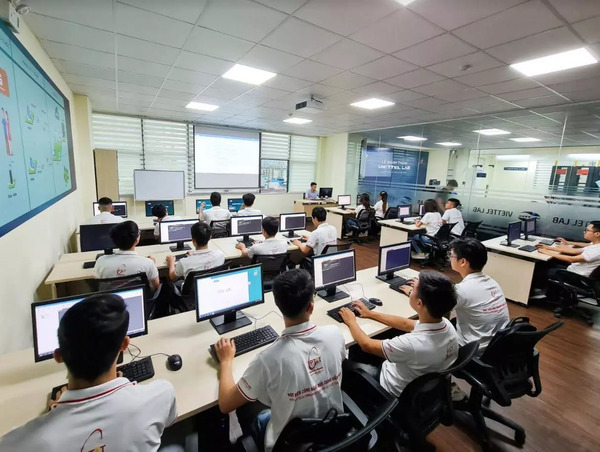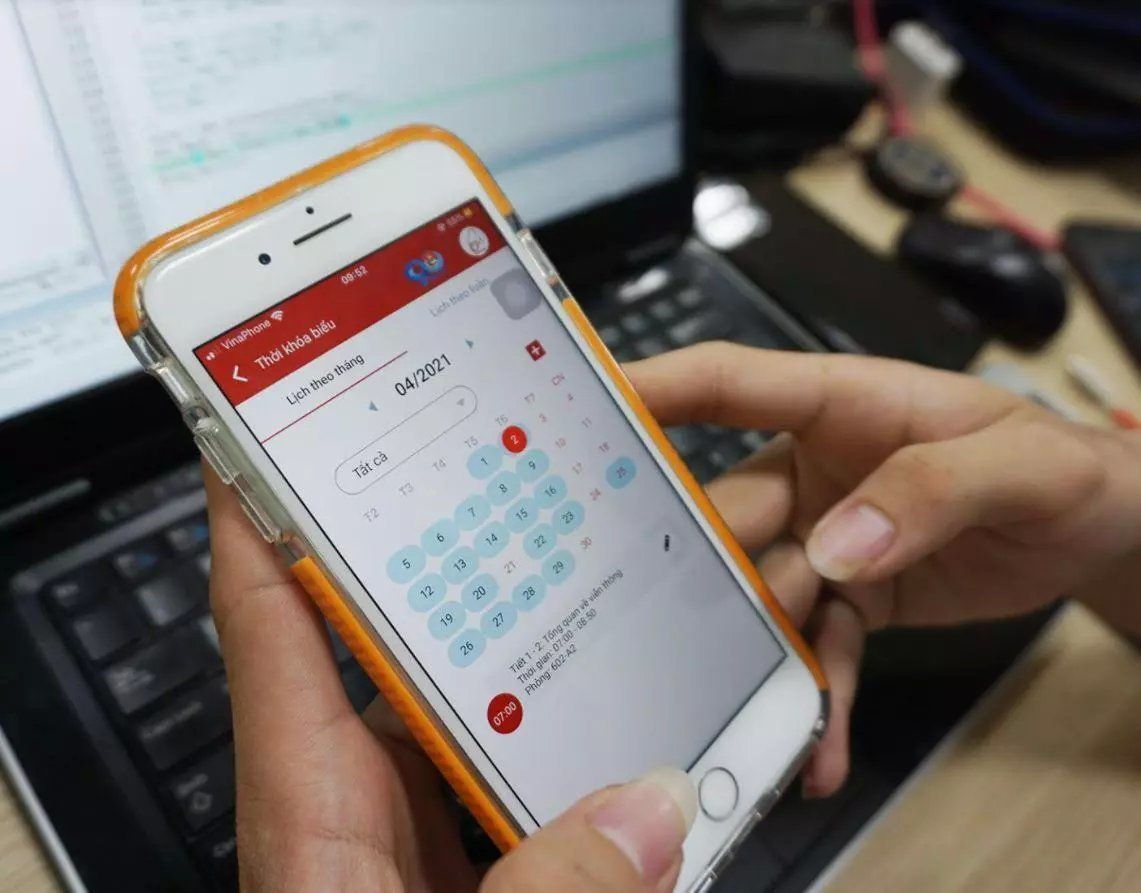
Dozens of students, lecturers and officers now can carry out nearly all activities: using motorbike parking service, keeping track of class schedules, checking exam scores and paying for meals with smartphones.
Dao Van Nghia, a third-year student majoring in Electronics Engineering, was working with a group of students in laboratory when his smartphone vibrated. PTIT S-Link had sent an alert about an upcoming lesson.
“The app is very useful. I can check exam scores with it, much more convenient that accessing the school’s website,” he explained. “When class time comes, it will send notifications about learning subjects, venues and other detailed information."
The app also has a one-stop shop function as described by a friend of Nghia.
“Previously, we had to come to the ‘one stop shop’ division to apply for checking exam papers and make payment. But now we can do it online. We just use the app and remit money via bank accounts,” he explained, adding that the app is being upgraded for other services as well.
Digital university model
PTIT S-Link used by Nghia is one of the apps PTIT put into operation in late 2020. To date, the app has had 12,000 downloads and has been serving students at the school.
D-Lab, the online practice platform and S-Class, the smart class platform and one intelligence operation center (IOC) will also begin operation in the time to come.
A digital university is taking shape at PTIT. In September 2020, during a talk with PTIT students, lecturers and officers, Minister of Information and Communications Nguyen Manh Hung said that activities of the institute will be carried out in a digital environment and everyone there will have a digital identification.
Hung went on to say that PTIT, a "miniature society" with young dynamic people has favorable conditions to build a digital society, where not only learning but management and living take place as well.
In order to prepare the labor force for digital transformation, it will be better to let them live, study and work in a digital environment. It is the best way to train digital citizens.
“The fourth quarter of 2020 and first quarter of 2021 will be the time for the institute to cooperate with a digital technology firm to build a digital university. Be the pioneer,” Hung said.
The Minister’s proposal has given a kick start to the institute.
“Since late 2020, we have been drastically speeding up digital transformation, planning to complete the first phase by March 31, 2021. And we have fulfilled the task,” said Doan Hieu, PTIT office manager.
The Ministry of Education and Training (MOET) said Vietnam is striving to become a leading country in digital transformation in the educational sector. It wants to produce Vietnamese citizens with digital transformation knowledge and skills who can become global citizens.
Gathering energy for renovation

Though the institute has been using IT in its activities for many years, it still faces difficulties upgrading the application. The biggest problem is the lack of a digital university model and digital transformation at university, not only in Vietnam but also in the rest of the world.
In the first period, PTIT is focused on researching and shaping the architecture of digital university and completing the digital transformation plan by 2025.
With the spirit of carrying out digital transformation in accordance with the "miniature digital nation", the institute studied national policies and built its digital transformation plan under the three pillars of the national digital transformation program – digital administration, digital service and digital society.
“A university bears the characteristics of a miniature society where a lot of institutions and individuals live, study and work. Therefore, it is reasonable to refer to the three pillars of the national digital transformation program,” Hieu explained.
Expanding digital university model
In December 2020, Minister Hung said that one digital university has likely become eligible for pilot transformation.
With instruction from the Minister and the strong determination of PTIT’s staff, the institute has become one of the pioneers in building and applying digital university model. But PTIT won’t be the only digital school.
The targets set in the Hanoi National University’s development strategy by 2030 are: reforming teaching methods towards modernization, integrating personalization into IT platforms, putting learners at the center, combining theory and practice; establishing an intelligent university management and organization model, performing comprehensive digital transformation in all activities, operating the shared digital data – digital information and digital knowledge system in a synchronous way; and interconnecting data for effective administration, management and renewal of teaching, learning and research activities.
One of the key tasks in 2021-2025 of the school is perfecting the modern university management and organization model in association with building smart universities.
Digital university models are gradually taking shape in Vietnam, one way or another.
Duy Vu

ICT Minister answers key questions about digital transformation
Minister of Information and Communications Nguyen Manh Hung posed key questions and outlined solutions to digital transformation issues at a recent meeting with officials of the southern province of Ba Ria - Vung Tau.

Vietnam Digital Transformation Day to take place in late May in Hanoi
Digital transformation progress in eight priority fields under the national digital transformation initiative would be discussed at the event.